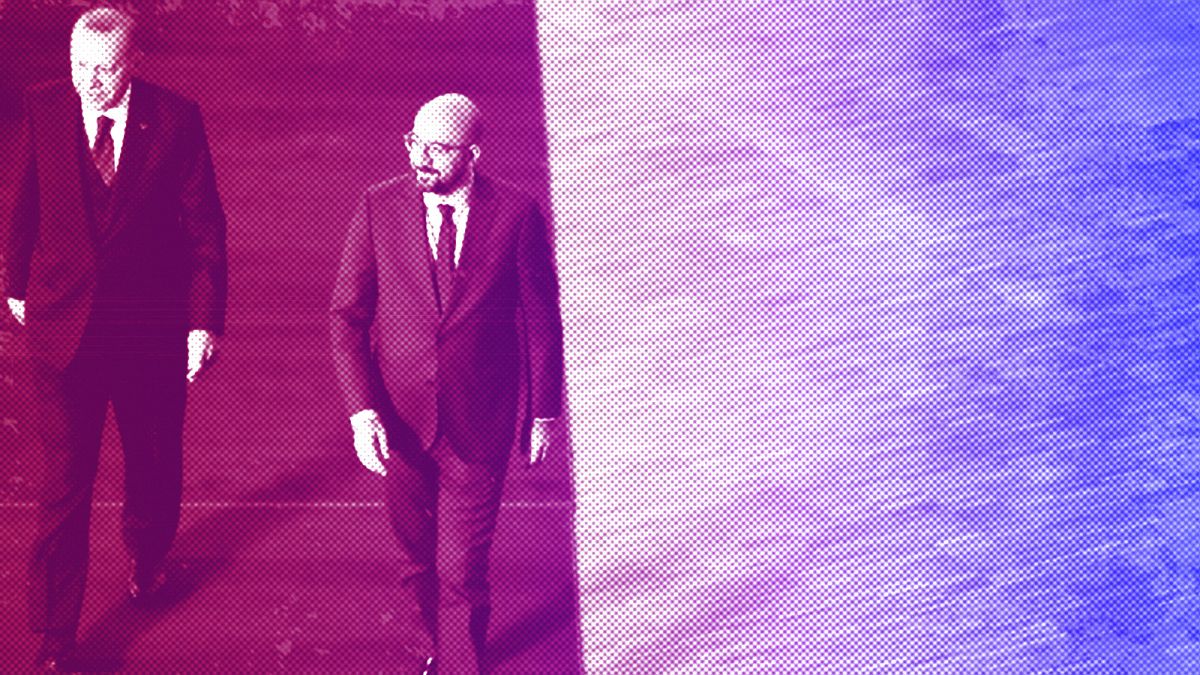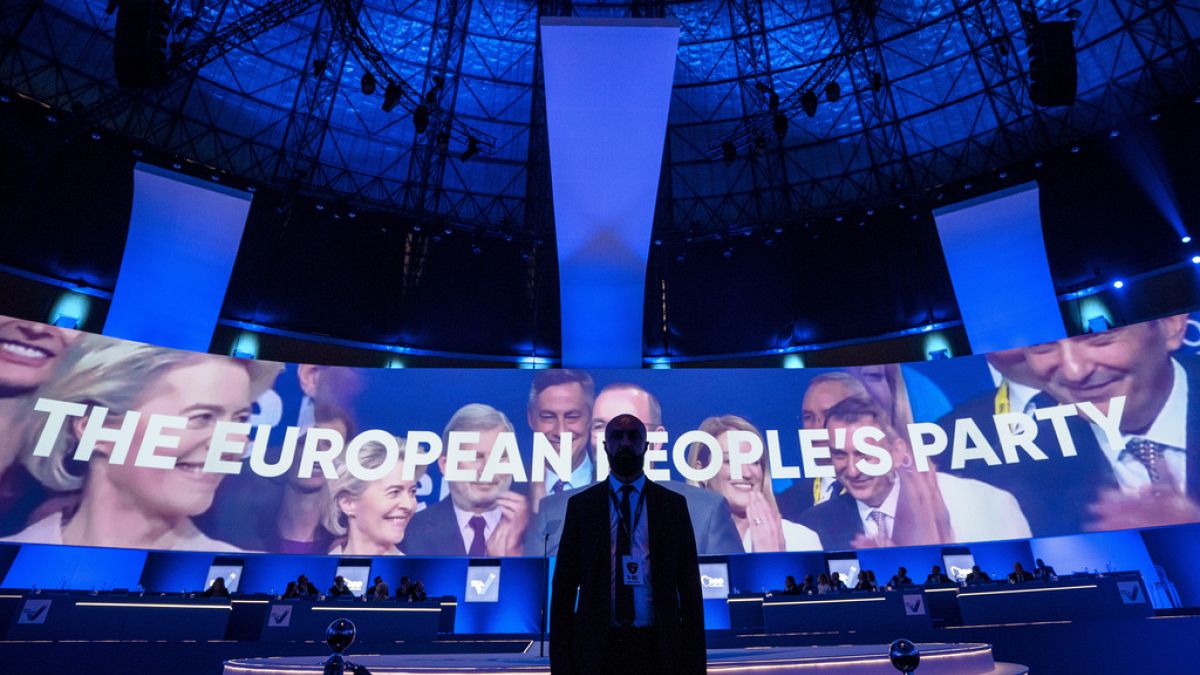World
Will the new year bring a positive change in EU-Turkey relations?

The opinions expressed in this article are those of the author and do not represent in any way the editorial position of Euronews.
In the European corridors of power, people are very well aware that if the necessary reforms are not implemented, 2024 will open another cycle of blame and threats that will poison EU-Turkey relations once again, Christos Kourtelis and Caglar Ozturk write.
A few months before the elections in Turkey in May, the incumbent President Recep Tayyip Erdoğan showed some signs of changing his aggressive tone towards the EU.
He stated that Turkey intended to become a full member of the EU and asked the Union to speed up the process.
However, such statements are not new to the president of Turkey, whose words and actions do not align. For the relationship to develop, a tangible change in the Turkish foreign and domestic policies is very much needed.
Such changes are very urgent, as Turkey’s accession process has been frozen since June 2018.
The positive agenda, launched in October 2020, did not yield serious results, as Turkey was threatening other EU member states with its drilling activities in the Eastern Mediterranean.
The threats from Brussels for sanctions helped to stop the Turkish drilling activities, but since then the discussions only focused on urgent challenges, such as the management of migration flows, the modernisation of the Customs Union (CU) and the visa liberalisation for Turkish citizens.
Is Turkey’s piecemeal approach hindering progress?
A few months ago, in June, to revitalise the positive agenda, the European Council asked the High Representative and the European Commission to prepare a report regarding the current state of the EU-Turkey relations and potential instruments and options to proceed strategically and in a “forward-looking manner”.
The report took into account the pillars of the positive agenda, yet the piecemeal approach of Turkey so far hinders the improvement of the bilateral relations.
More specifically, the fact that Turkey has not managed to meet all the criteria of the roadmap that was prepared alongside the March 2016 EU-Turkey Statement does not help policymakers in the EU to suggest the liberalisation of visas.
Actually, in recent years there has been an increasing rejection of visa applications of Turkish citizens.
It seems that the EU institutions have acknowledged the slow reform process in the candidate country, as the joint communication advises the member states to facilitate access only to specific groups, such as students, entrepreneurs and Turkish citizens with family members in the EU.
Problems in trade rules remain unaddressed
The modernisation of the CU is another important topic in the bilateral relations. Following the European Commission’s request from the World Bank regarding the impact of the modernisation of the Customs Union and the agreement for the migration flows in 2016, the two sides decided to resume discussions about the CU.
The discussions were quickly interrupted due to the Turkish provocations in the East Mediterranean and the barriers that the Turkish government posed to bilateral trade.
The current government promised to address the problems in its trade rules, but the most recent joint communication has linked the modernisation of the CU to the resumption of the Cyprus settlement talks according to the UN auspices.
Given that Turkey advocates a two-state solution, it is very interesting to see if the current government will manage to make a U-turn and how it will communicate a change in its foreign policy (according to the UN mandates) to its domestic audience.
Migration key to Ankara’s credibility
Another important problem is related to the disinterest of Turkey to receive irregular migrants from European countries.
The lame excuse of the potential spread of COVID-19 made the EU-Turkey migration deal dysfunctional and as a result, the Aegean and Balkan routes are now complemented by increasing numbers of migrants passing towards Cyprus.
Turkey ought to respect its commitment to the agreement to increase its credibility as an international negotiator.
At the same time, and as long as Turkey does not act aggressively towards other EU member states, Brussels must also pay more attention to issues which are very critical to the candidate country, such as economic growth, energy and transport.
The invitation to the Turkish ministers to the informal meetings of EU foreign ministers (Gymnich meetings) is a good start to exchange views about common problems in a more structured way.
These discussions will shine a light on whether or not the Turkish side is ready to realign with the CFSP.
Lack of trust and low expectations
2024 is set to demonstrate whether or not the Turkish positive rhetoric is meaningful or if it is another move of the Ankara administration to achieve temporary gains.
The recent visit of Erdoğan to Athens indicated that there is a wind of change, but not many people in Brussels trust the Turkish leader.
The recent joint communication clearly shows that policymakers in the EU do not have high expectations, as Turkey must cover a long reform process.
In the European corridors of power, people are very well aware that if the necessary reforms are not implemented, the new year will open another cycle of blame and threats that will poison EU-Turkey relations once again.
Christos Kourtelis is Assistant Professor in European Public Policy at Panteion University, and Caglar Ozturk is independent researcher in EU-Turkey relations.
At Euronews, we believe all views matter. Contact us at view@euronews.com to send pitches or submissions and be part of the conversation.

World
Nelly Addresses Criticism of Performance at Trump Inauguration Ball: ‘I’m Doing This Because It’s an Honor’

Nelly is speaking out against critics who have denounced his performance at tomorrow’s Liberty Inaugural Ball, one of three official balls celebrating Donald Trump’s return to the presidency.
The St. Louis rapper addressed the appearance during an interview with Willie D Live, downplaying the political implications of the performance and stating that he’s simply honoring the moment by showing up for the event.
“I thought you was riding with me because I put on for my city and I try to bring my city up every step of the way. I did not know you was riding with me because you thought I would ride with who you voted for. I didn’t know that,” he said. “I didn’t know I had to agree with your political choices, and I thought it was the things that you do not the things that you say should be done. If you follow what I do, this shouldn’t even be an argument. He’s the president. He won. This isn’t a campaign, this isn’t an RNC. I’m not out on a political campaign.”
He continued by likening the performance to the same sense of civic duty that American military personnel feel in defending their country. “I’m not doing this for money, I’m doing this because it’s an honor. I respect the office. It doesn’t matter who is in office,” he said. “The same way that our men and women, our brothers and sisters who protect this country, have to go to war and have to put their life on the line for whoever in office. So if they can put their life on the line for whoever in office, I can damn sure perform.”
Willie D brought up criticisms that performing for the office meant appearing in support of Trump. “More than half this country voted for Trump. If you respect the process when the process works in your favor, respect the process when it doesn’t work in your favor,” responded Nelly.
Numerous representatives for the rapper did not respond to Variety‘s earlier requests for comment.
At the Liberty Inaugural Ball, Nelly will grace the stage alongside Village People, whose classic “Y.M.C.A.” became a recurring song played during Trump’s campaign rallies. Village People released a statement earlier this week about its involvement in events surrounding Trump’s swearing-in. “We know this won’t make some of you happy to hear however we believe that music is to be performed without regard to politics,” the group wrote on Facebook. “Our song Y.M.C.A. is a global anthem that hopefully helps bring the country together after a tumultuous and divided campaign where our preferred candidate lost. Therefore, we believe it’s now time to bring the country together with music which is why VILLAGE PEOPLE will be performing at various events as part of the 2025 Inauguration of Donald J. Trump.”
While Nelly and Village People will perform at balls, Carrie Underwood, Lee Greenwood and Christopher Macchio are scheduled to perform at the inauguration itself. On Friday, Snoop Dogg, Rick Ross and Soulja Boy appeared at the Crypto Ball, eliciting divisive online reactions that pointed out previous contradictory statements by some of the rappers.
Nelly also sang a different tune about Trump, telling Page Six in 2017 that he didn’t agree with his approach as commander-in-chief. “You know the thing about Donald Trump is that I liked Donald Trump, I did, I just don’t like Donald Trump as my president,” he said. “Dude is a trip. Pre-presidency, I was cool with the Donald. Loved his hotels. I’m more or less mad at him because I can’t stay at his hotel now. You done fucked that up. And I’ve been staying there for 15 years, and now you pull this. Get it together, homie.”
World
German ambassador warns Trump will 'undermine' democratic principles with 'maximum disruption' agenda: report

Germany’s ambassador to the U.S. has warned that President-elect Donald Trump’s administration will “undermine” democratic principles with a “maximum disruption” agenda, according to a report.
Reuters reported that it viewed a confidential briefing document signed by Ambassador Andreas Michaelis that describes the incoming Trump agenda as “a redefinition of the constitutional order – maximum concentration of power with the president at the expense of Congress and the federal states.”
“Basic democratic principles and checks and balances will be largely undermined, the legislature, law enforcement and media will be robbed of their independence and misused as a political arm, Big Tech will be given co-governing power,” reads the document, which was dated Jan. 14.
Fox News Digital reached out to the Trump transition team for comment but did not immediately hear back.
TRUMP INAUGURATION: WHO IS EXPECTED TO ATTEND, AND WHO IS BOYCOTTING?
President-elect Donald Trump speaks at a meeting with Republican governors at Mar-a-Lago, on Jan. 9, 2025, in Palm Beach, Florida. (AP Photo/Evan Vucci, File)
Michaelis said recent actions by Trump and billionaire tech CEO Elon Musk could lead to a “redefinition of the First Amendment.”
“One is using lawsuits, threatening criminal prosecution and license revocation, the other is having algorithms manipulated and accounts blocked,” the document reads, per Reuters.
Musk supported Trump throughout the election, and was tapped by the president-elect to co-lead the Department of Government Efficiency.
GERMANY ACCUSES ELON MUSK OF TRYING TO INTERFERE IN ITS NATIONAL ELECTIONS
Last month, Germany accused Musk of attempting to interfere in the country’s upcoming parliamentary elections on behalf of the country’s far-right political party, German Alternative for Germany, citing recent social media posts and a weekend op-ed doubling down on his endorsement.
Meanwhile, Michaelis even claimed that Trump could force his agenda on states using broad legal options and that “even military deployment within the country for police activities would be possible in the event of declared ‘insurrection’ and ‘invasion’.”
The 1878 Posse Comitatus Act, however, bars federal troops from participating in civilian law enforcement unless Congress overrides the federal law.
CLICK TO GET THE FOX NEWS APP
Despite what Michaelis says in the reported document, the German foreign ministry has acknowledged Trump won the democratic election and said it will “work closely with the new U.S. administration in the interests of Germany and Europe.”
World
‘My children, my children’: The Gaza family killed minutes before ceasefire

Khan Younis, Gaza Strip, Palestine – The ceasefire in Gaza was supposed to start at 8.30am (06:30 GMT). The al-Qidra family had endured 15 months of Israeli attacks. They had been displaced more than once and were living in a tent. Their relatives had been among the more than 46,900 Palestinians killed by Israel.
But the al-Qidras had survived. And they wanted to go home.
Ahmed al-Qidra packed his seven children onto a donkey cart and headed to eastern Khan Younis. It was finally safe to travel – the bombing should have stopped.
But the family did not know that the ceasefire between Israel and Hamas had been delayed. They did not know that, even in those additional few hours, Israeli aircraft were still flying over the skies of Gaza, ready to drop their bombs.
The explosion was loud. Ahmed’s wife Hanan heard it. She had stayed behind at a relative’s home in the centre of the city, organising their belongings, planning on joining her husband and children a few hours later.
“The blast felt like it hit my heart,” Hanan said. She instinctively knew that something had happened to her children, whom she had only just said goodbye to.
“My children, my children!” she screamed.
The cart had been hit. Hanan’s eldest son, 16-year-old Adly, was dead. So was her youngest, six-year-old Sama, the baby of the family.
Yasmin, 12, explained that a four-wheel drive was in front of the cart carrying people celebrating the ceasefire. Perhaps that was the reason the missile hit.
“I saw Sama and Adly lying on the ground, and my father bleeding and unconscious on the cart,” Yasmin said. She pulled her eight-year-old sister Aseel out before a second missile hit the spot where they had been. Eleven-year-old Mohammed also survived.
But Ahmed, Hanan’s partner in life, was pronounced dead in the hospital.
‘My children were my world’
Sitting on the edge of her injured daughter Iman’s hospital bed in Khan Younis’s Nasser Hospital, Hanan was still shell-shocked.
“Where was the ceasefire?” she asked. In their excitement to finally return to whatever was left of their home, the family had missed Israeli Prime Minister Benjamin Netanyahu declaring that the Palestinian group Hamas had not sent over the names of the three Israeli captives who would be released on Sunday as part of the ceasefire deal.
They had not seen Hamas explain that there were technical reasons for the delay, and that the names would be provided, as they eventually were.
They would not know that in the three-hour delay before the ceasefire eventually began, three members of their family would be killed. They were among the 19 Palestinians killed by Israel in those last few hours, according to Gaza’s Civil Defence.

Hanan broke down in tears. She would now have to face life without her husband and without two of her children. The loss of Sama, “the last of the bunch” as she described her with the Arabic saying, was particularly hard.
“Sama was my youngest and the most spoiled. She’d get angry whenever I talked about having another child.”
Adly had been her “pillar of support”. Her children were her world.
“We endured this entire war, facing the harshest conditions of displacement and bombardment,” Hanan said. “My children dealt with hunger, a lack of food and basic necessities.”
“We survived more than a year of this war, only for them to be killed in its last minutes. How can this happen?”
A day of joy had been turned into a nightmare. The family had celebrated the end of the war the night before.
“Hasn’t the Israeli army had enough of our blood and the atrocities they committed for 15 months?” Hanan asked.
Then, she thought of her future. With her husband and two of her children ripped away from her, and with tears coming down her face, she asked: “What’s left?”
-

 Science1 week ago
Science1 week agoMetro will offer free rides in L.A. through Sunday due to fires
-
/cdn.vox-cdn.com/uploads/chorus_asset/file/23935558/acastro_STK103__01.jpg)
/cdn.vox-cdn.com/uploads/chorus_asset/file/23935558/acastro_STK103__01.jpg) Technology1 week ago
Technology1 week agoAmazon Prime will shut down its clothing try-on program
-
/cdn.vox-cdn.com/uploads/chorus_asset/file/25826211/lorealcellbioprint.jpg)
/cdn.vox-cdn.com/uploads/chorus_asset/file/25826211/lorealcellbioprint.jpg) Technology1 week ago
Technology1 week agoL’Oréal’s new skincare gadget told me I should try retinol
-
/cdn.vox-cdn.com/uploads/chorus_asset/file/25832751/2192581677.jpg)
/cdn.vox-cdn.com/uploads/chorus_asset/file/25832751/2192581677.jpg) Technology4 days ago
Technology4 days agoSuper Bowl LIX will stream for free on Tubi
-

 Business6 days ago
Business6 days agoWhy TikTok Users Are Downloading ‘Red Note,’ the Chinese App
-
/cdn.vox-cdn.com/uploads/chorus_asset/file/25835602/Switch_DonkeyKongCountryReturnsHD_scrn_19.png)
/cdn.vox-cdn.com/uploads/chorus_asset/file/25835602/Switch_DonkeyKongCountryReturnsHD_scrn_19.png) Technology2 days ago
Technology2 days agoNintendo omits original Donkey Kong Country Returns team from the remaster’s credits
-

 Politics1 week ago
Politics1 week agoTrump to be sentenced in New York criminal trial
-

 Culture2 days ago
Culture2 days agoAmerican men can’t win Olympic cross-country skiing medals — or can they?


















